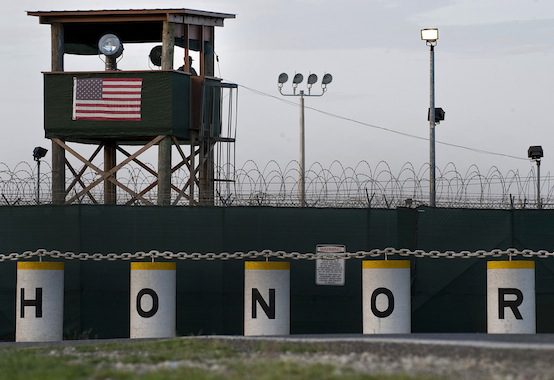Fear and Loathing in Guantanamo Bay

The Guantanamo Bay detention center briefly reasserted its presence in the public consciousness this month with the news that a single Navy nurse refused to participate in the force-feeding of detainees on hunger strike. Quietly feted by civil liberties advocates, the story quickly slipped off the radar. The Pentagon confirmed that the nurse “has been temporarily assigned to alternate duties with no impact to medical support operations”—in other words, the torturous force feedings, instituted in 2006, will continue unabated.
Gitmo currently houses 149 inmates. Fewer than 20 detainees have been charged, and 78 are cleared for release—a status some have held for more than half a decade. About 45 prisoners are scheduled for indefinite detention, never to see a day in court.
The tepid response to the nurse’s moral stand is not surprising. Despite the fervor of outspoken antiwar protesters during the Bush years, the broader public has never cared much about the welfare of those imprisoned in Guantanamo Bay, innocent or no. Support for closing the facility peaked at 51 percent in early 2009. That high corresponded with the first inauguration of President Barack Obama, who took office trumpeting his intentions to put an end to Bush-era abuses like Guantanamo, which he labeled a betrayal of American ideals.
A year after the inauguration, the Obama administration’s now-extensive history of Gitmo excuse-making was well underway. “Political opposition” caused the President to break his promise. Temper your expectations, an anonymous White House official suggested, “The president can’t just wave a magic wand and say that Gitmo will be closed.” But of course—of course!—it’s still going to happen.
Come 2011, we found the President admitting that the facility won’t be closed in the near future. “[W]ithout Congress’s cooperation, we can’t do it,” he said. “That doesn’t mean I stop making the case.” And that narrative—the “I really want to close Guantanamo, but Congress just won’t let me!” line—has persisted ever since, typically with a heavy dose of partisan undertones. As Obama moved an issue he once called vital to the restoration of the United States’ moral authority to the backburner, public opinion followed his cue. By 2010, only 39 percent supported closing the prison. Today, just 27 percent are on board.
What’s fascinating about this unwillingness to close Guantanamo Bay as observed in government and citizens alike is the way it encapsulates the charade of modern American politics: a GOP that abandons its support for limited government out of fear, and a Democratic Party whose civil libertarianism is built more on partisan rancor than ethics.
Let’s look at the Republican opposition first—for those partisan undertones in Obama’s narrative are two-faced but not unfounded. Led by hawks like Sen. Lindsey Graham (R-S.C.), congressional Republicans have indeed worked to keep Gitmo open. Polling suggests they have the full support of their GOP constituents—no less than 81 percent want the detention center to stick around—and even Sen. Rand Paul (R-Ky.), perhaps Graham’s staunchest foreign policy opponent in the Senate, agrees with his South Carolinian colleague on this point.
But what about Gitmo meshes with the small government philosophy Republicans espouse? Each prisoner costs taxpayers $2.7 million annually, a massive failure on the fiscal responsibility front (federal prison, for comparison, spends $26,000 a year per inmate).
Even worse for conservatives should be the prison’s blatant trampling of constitutional rights. It has long been held by the Supreme Court that the Constitution’s guarantees of trial rights and habeas corpus apply not only to American citizens, but also to foreign nationals held on American soil. This was the basis of the 1886 ruling in Yick Wo v. Hopkins, in which a Chinese citizen’s conviction in California was overturned on 14th Amendment grounds. The universality of the Constitution’s protections was reaffirmed in 2008’s Boumediene v. Bush, where the majority opinion, the dissenting opinion, and even the Bush Administration all agreed that foreign detainees in American territory have constitutional rights to a formal charge and trial. The court ruled that Guantanamo Bay, which is leased from Cuba but under the United States’ complete legal jurisdiction, counts as American territory in the question of habeas corpus rights.
When Republicans support maintaining Gitmo, they are backing an expensive, lawless boondoggle out of fear, not any commitment to limited government.
And then there are the Democrats. The last big Gitmo news came in June, when Obama released five prisoners in exchange for the return of Sgt. Bowe Bergdahl. What too few pointed out is that this release—conducted without congressional approval—indicates that the President’s excuse narrative is fictional and hypocritical.
For the President who announces his willingness to rule by executive fiat when Congress won’t cooperate to suddenly find his pen and phone have gone missing when it comes to Guantanamo Bay is disingenuous at best. Of course, Obama’s 2013 decision to close the office dedicated to closing Gitmo revealed this disconnect long before the Bergdahl releases. It is more than clear that his often insightful Guantanamo promises were less about American ideals than they were about American votes, as he supplied 2008 voters with the repudiation of the previous administration that assured his victory.
The Democratic Party’s civil libertarianism was about being not-Bush, about loathing, not conviction; it has proved as fickle as the storms of partisan politics.
After a dozen years, it is difficult to imagine the political will being generated to close the Guantanamo Bay detention camp once and for all. Though I hope for the sake of the innocent and the rule of law that it is my imagination which is inadequate, for the time being Gitmo offers a valuable crystallization of the lack of principle plaguing both parties.
Bonnie Kristian is a writer who lives in the Twin Cities. She is a communications consultant for Young Americans for Liberty and a graduate student at Bethel Seminary. Find her at bonniekristian.com and @bonniekristian.
Comments